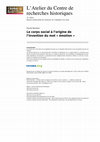books by Nicole Hochner
ÉPOQUES EST UNE COLLECTION DIRIGÉE PAR JOËL CORNETTE Illustration de couverture : Jean Perréal (v... more ÉPOQUES EST UNE COLLECTION DIRIGÉE PAR JOËL CORNETTE Illustration de couverture : Jean Perréal (vers 1455-1527/29) : Portrait de Louis XII (vers 1514 ?) Château de Windsor, collections de SM la Reine d'Angleterre. © 2006, CHAMP VALLON, 01420 SEYSSEL ...
Special Issue by Nicole Hochner
PERSPECTIVES sur l’histoire, la culture et la société française, 2022
Refereed articles or chapters by Nicole Hochner

Journal of Classical Sociology, 18(4), 299–312, 2018
Contrary to most readers who have emphasized the notions of passage or liminality, I demonstrate ... more Contrary to most readers who have emphasized the notions of passage or liminality, I demonstrate in this study that Van Gennep’s Rites de passage is articulated around the four notions of sequences, margins, passages, and schema. Subsequently, the main claim of this article is to propose the idea of social kinesis—or social rhythm—as the crux of Van Gennep’s theory. Such a fresh reappraisal of Van Gennep is also an opportunity to show how Pierre Bourdieu sought for social laws and regularities in a rather deterministic fashion, and completely overlooked Van Gennep’s idea of motion. More importantly, this article is an invitation to reconsider Van Gennep’s epistemological approach as a bridge between the social and the life sciences. Indeed, Van Gennep’s so-called méthode des séquences emerges from a dialogue between the social sciences and biology on the one hand, and with cosmology on the other. Indeed, I illuminate how Van Gennep investigated the enigmas of social life and dynamics within the framework of his understanding of metabolism and regenerative processes.

Despite the fact that historians analyze emotions of classical antiquity, the term 'emotion' itse... more Despite the fact that historians analyze emotions of classical antiquity, the term 'emotion' itself is a rather recent term that appears only in the fifteenth century. The 'invention' of the word 'emotion' is a French one, but it quickly reaches other languages, such as English. At first the word 'emotion' has a political meaning and designates an uprising or a popular rebellion. The present study proposes first to examine the precise context of the formation and appearance of the word 'emotion', which oddly has not attracted systematic study so far. In reality, the investigation of the political origins of the word will prove that the political agitation and upheavals of France at the time are not enough to explain the appearance of the new term. It is indisputable that political realities have their room in the cultural and political context of the invention of the word emotion, but this article will argue that the indispensable and constitutive element to the formation of the word 'emotion' is the imaginary body politic that is profoundly transformed during that is profoundly transformed by Nicole Oresme. This article will demonstrate how and why the body politic image should be considered as the metaphorical cradle of the word 'emotion' that since then has completely lost its political resonance
Niccolò Machiavelli died nearly five hundred years ago, in 1527, and his name does not cease to f... more Niccolò Machiavelli died nearly five hundred years ago, in 1527, and his name does not cease to fascinate scholarly, intellectual and popular imaginations alike. Dubious versions of his thought, mainly based on a decontextualized reading of The Prince, are discussed in university handbooks for political science students, his persona characterized in video games like Assassin's Creed and television series like The Borgias.

During the fifteenth century the organic body politic metaphor was gradually associated or supers... more During the fifteenth century the organic body politic metaphor was gradually associated or superseded by a physiological paradigm built on the ancient humoral theory. The new body politic, based on humours rather than on organs, eventually became a dynamic and fluid entity. Authors such as Nicole Oresme or Jean Gerson alleged that the etiology of humoral imbalance had its origins in growing social inequalities; Claude de Seyssel subsequently urged that the cure to restore the humoral balance should focus on creating new hope and bridges for the gifted. Seyssel was able to draw up his pioneering manifesto for social mobility thanks to the new physiological image of the civic body. The present study argues that such a physiological conception transformed anxiety about motion and disarray into a belief that social fluidity was indispensable to the well-being and health of the whole body, but the idea that (social) order and movements are not conflicting, was soon eradicated by new perspectives on nobility constructed on race and blood.
History of Political Thought, 2009
Abstract: The considerable interest with which Machiavelli treats public oaths, exe-cutions and r... more Abstract: The considerable interest with which Machiavelli treats public oaths, exe-cutions and religious or civic cults in general indicates the major role he gives to ritual-ized gestures in the fabrication of the political spectacle. This study argues that Machiavelli's conception of ...
Exploring Cultural History Essays in Honour of Peter Burke 2010 Isbn 9780754667506 Pags 231 248, 2010









Uploads
books by Nicole Hochner
Special Issue by Nicole Hochner
Refereed articles or chapters by Nicole Hochner